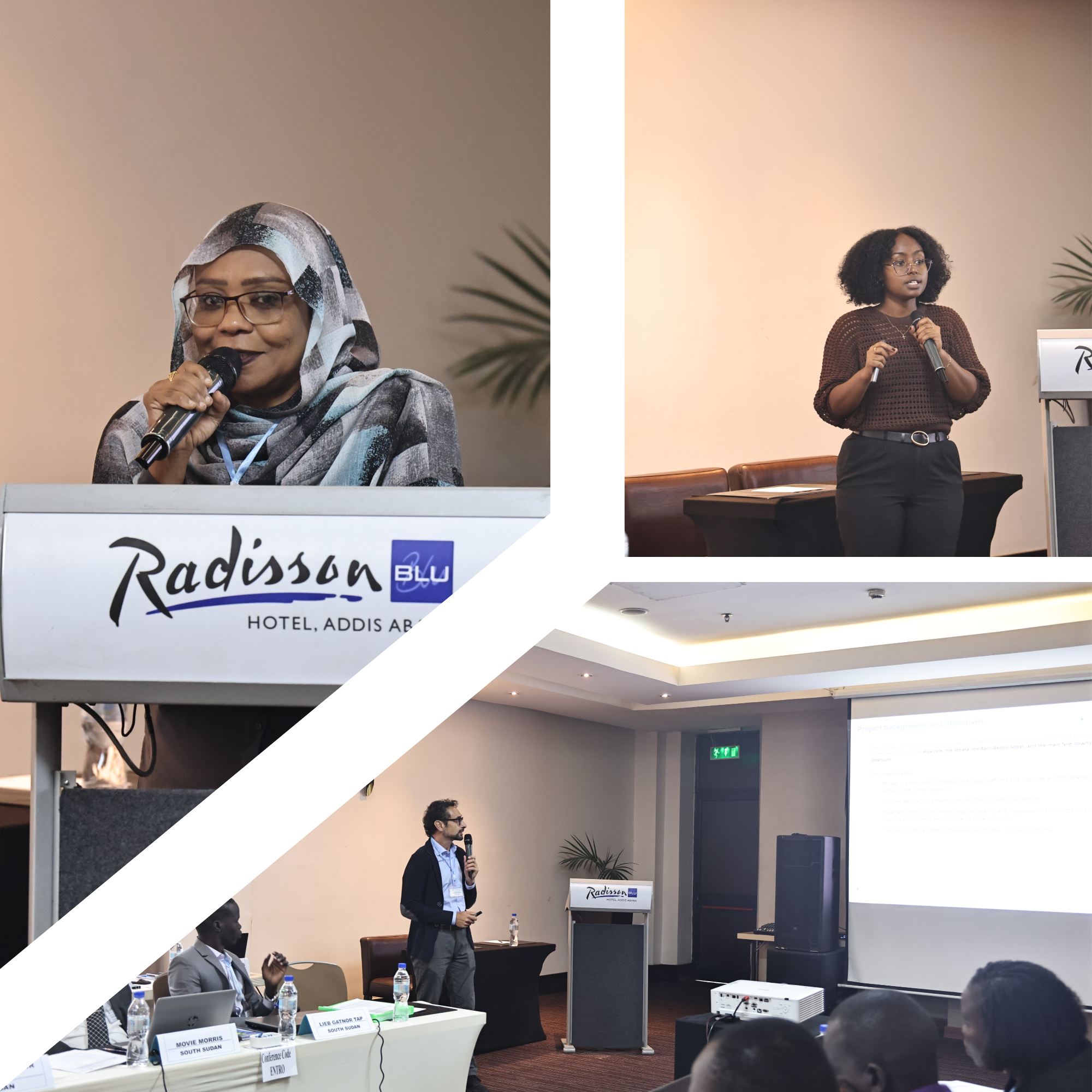𝑽𝒂𝒍𝒊𝒅𝒂𝒕𝒊𝒐𝒏 𝑾𝒐𝒓𝒌𝒔𝒉𝒐𝒑 𝒐𝒏 𝒕𝒉𝒆 𝑫𝒆𝒗𝒆𝒍𝒐𝒑𝒎𝒆𝒏𝒕 𝒐𝒇 𝑬𝒂𝒔𝒕𝒆𝒓𝒏 𝑵𝒊𝒍𝒆 𝑾𝒂𝒕𝒆𝒓 𝑹𝒆𝒔𝒐𝒖𝒓𝒄𝒆𝒔 𝑷𝒍𝒂𝒏𝒏𝒊𝒏𝒈 𝑴𝒐𝒅𝒆𝒍𝒔 𝒂𝒏𝒅 𝑻𝒐𝒐𝒍𝒔.
The validation workshop is being held in Addis Ababa, Ethiopia, from June 12 to June 14, 2025. The primary objective of this workshop is to validate the methodologies, tools, and outputs developed across six work packages, while also gathering feedback from stakeholders to ensure their relevance and effectiveness.
Participants in this workshop include experts in water resources modeling, water resources planning, and sediment transport modeling from the Eastern Nile (EN) countries. Additionally, members of the Regional Technical Working Group and representatives from the Nile Basin Initiative (NBI) centers are also in attendance.
The validation workshop proceeded with opening remarks. Accordingly, Eng. Teshome Atnafie, Acting Executive Director of ENTRO, opened the validation workshop by welcoming the attendees. He outlined the workshop's primary objective and noted that the event would serve as a platform to disseminate these new models and tools to stakeholders.
Eng. Teshome underlined that water resource modeling tools and knowledge products are critical for effective water resources planning and management, thus ENTRO has developed and archived various models, toolkits and databases, including Riverware, RIBASIM, HEC-ResSim, SWAT and other models. However, challenges remain in data accessibility, model accuracy and knowledge sharing, limiting the full potential use of these models in water resources planning and manage ent related activities.
The Acting ED emphasized that the robust and user-friendly tools are designed to meet the specific needs of Eastern Nile stakeholders. He stated they will significantly contribute to improved water resource planning, informed decision-making, and sustainable development in the region. Following his remarks, Eng. Teshome invited the Sudanese ENSAPT member to give remarks.
Eng. Teshome Atnafie, Acting Executive Director of ENTRO
Thus Eng. Saied Magzoub, representing the Sudan ENSAPT, thanked the Ethiopian government for hosting the important workshop. He acknowledged the hard work of the ENTRO team and experts in building tools that accurately model our region's water resources, including hydrology, hydraulics, and sediment transport.
He stated, "these tools are not just scientific achievements; they are an instrument of cooperation, trust-building, and informed decision-making." Eng. Saied concluded by encouraging everyone to share their expertise to validate the models, ensuring they are technically correct, reflect local knowledge, and can be trusted for planning and discussions between our countries.
Eng. Saied Magzoub Sudan ENSAPT
Following the Sudan remarks, South Sudan ENSAPT Member, Richard Gama, on his remarks states that this project has taken 15 months to reach its current stage and has undergone multiple validation workshops which has incorporated expertise from various countries to achieve this progress.
Eng. Richard encourages all technical team members to collaborate closely with the consultant and share their insights to reach the final stage of the development.
He said that “the final delivery will remain with us. While we have previously relied on existing water resource tools and models, this project aims to develop innovative tools and techniques to enhance water resource management in the basin.”
Finally, he appreciates everyone’s efforts and encourages all to make the most of their time moving forward.
Mr. Richard Gama South Sudan ENSAPT
The welcoming remark was given by the ENSAPT Chair Dr. Zebene Lakew, by which he welcomed all participants to Addis Ababa and to the validation workshop on the development of the Eastern Nile water resource models and tools with the financial support of the World Bank.
Dr. Zebene Lakew ENSAPT Chair
The ENSAPT Chair states that “We have gathered not only to reflect on the recently developed models and tools but also to share the vital ideas and experiences that will shape the future of water resource management in our basin.” He said that as technical experts in respective fields, insights are crucial in ensuring these tools which are not only scientifically robust but also practical and applicable for real-world challenges. Also, Dr. Zebene states that the interactive discussions, combined with the planned presentations and data activities, will be highly productive, which will minimize the challenges we face and better harness the potential of our shared water resources for the benefit of all our people.
In conclusion, Dr. Zebene extended his gratitude to the World Bank, the workshop organizers, and all participants. He wished everyone fruitful deliberation and with that, officially opened the meeting.

The workshop is expected to deliver the following outputs:
- Validated methodologies and outputs for the six work packages.
- Feedback and recommendations for improving the models, tools, and platforms.
- Enhanced stakeholder awareness of the Eastern Nile water resources models and tools.